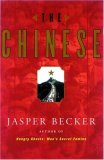Summary | Excerpt | Reviews | Readalikes | Genres & Themes | Author Bio

Critics' Opinion:
Readers' Opinion:
First Published:
Dec 2000, 304 pages
Paperback:
Feb 2002, 493 pages
The biggest split among Chinese modernizers of the period emerged over what political institutions were best suited to this newly regenerated state. Chiang Kai-shek, who succeeded Sun Yat-sen as the head of the Nationalist Party (the Kuomintang, or KMT), though he became increasingly dictatorial, nevertheless attempted to adopt many of the elements of a modern liberal Western state. These reforms, although derided by many for their often considerable shortcomings, were astonishing in the context of Chinese history. The crushing hand of the central state was lifted. For the first time in thousands of years there came into being in China independent schools and universities, a free media, an independent judiciary, independent trade unions, competing political parties and a capitalist system of competitive enterprise, and for the first time the Chinese enjoyed freedom of movement within the country and the freedom of assembly.
While these new institutions were often corrupt or inadequate, the credibility of the whole endeavour, which some called 'complete Westernization', was undermined by the encroachments of the Japanese. In 1931 the Japanese army occupied Manchuria and created the state of Manchukuo with Pu Yi, the last Qing emperor, as its puppet head. In 1937 it then invaded the rest of China. By the end of the 1930s, the Japanese had occupied Beijing, taken control of Shanghai and massacred the inhabitants of Nanjing, the KMT capital, and the KMT was forced to set up a temporary capital in Chongqing, on the upper reaches of the Yangtze.
While Chiang Kai-shek had chosen to adopt one model from the West, other Chinese were inspired by the collapse of imperial Russia and by the new Communist government that had seized power there. The Chinese Communist Party was founded in 1921 in Shanghai by a small group of intellectuals. At first it existed as an offshoot of the Kuomintang but in 1927 it split away after trying to foment uprisings among Shanghai's working class.
The Communist movement, supported by Moscow, offered an alternative vision. China was weak not because of the shortcomings of the Chinese race but because of the existence of class conflict between the rich and the poor. The ruling classes, capitalists, landlords and even the wealthy peasantry had to be destroyed before an egalitarian Utopia could be built. After Chiang Kai-shek crushed the Party in urban areas in a sudden campaign in 1927, it took refuge in rural China.
As Chiang Kai-shek sought to re-establish control, the Communists set up a number of soviets or mini-states in mountainous areas, often straddling the borders of different provinces. In 1934 Chiang's forces encircled the largest, on the borders of Jiangxi and Fujian provinces, forcing the Communists to break out and embark on what became known as the Long March. Traversing some of China's poorest and most remote regions, and harried by the armies of Chiang and local warlords, the Communists finally found safety in Yan'an, a poverty-stricken area in the heartland of the old Qin kingdom on the loess plateau. From there, now led by Mao Zedong, they succeeded in capturing Chiang and, holding him hostage in Xi'an, forced him to agree to a united effort to fight the Japanese. Thanks to the Japanese threat, therefore, the Communists now received aid and survived.
In Yan'an Mao established his control over the CCP and developed his political philosophy. In many public statements, it appeared to be liberal, advocating the right of minorities to secede, endorsing free elections and democracy, supporting trade unions and labour rights, promoting the freedom of intellectuals and so on. In reality, Mao's kingdom in Yan'an was closely modelled on that of Stalin's Soviet Union. Mao created a personality cult around himself and wielded absolute power through a series of persecution campaigns.
With the defeat of Japan at the end of the Second World War, the civil war in China between the Kuomintang and the Communists intensified. The KMT was defeated and fled to Taiwan, and in October 1949, Mao announced the founding of the People's Republic of China.
Copyright © 2001 by Jasper Becker.





The Flower Sisters
by Michelle Collins Anderson
From the new Fannie Flagg of the Ozarks, a richly-woven story of family, forgiveness, and reinvention.

The House on Biscayne Bay
by Chanel Cleeton
As death stalks a gothic mansion in Miami, the lives of two women intertwine as the past and present collide.

The Funeral Cryer by Wenyan Lu
Debut novelist Wenyan Lu brings us this witty yet profound story about one woman's midlife reawakening in contemporary rural China.
Your guide toexceptional books
BookBrowse seeks out and recommends the best in contemporary fiction and nonfiction—books that not only engage and entertain but also deepen our understanding of ourselves and the world around us.